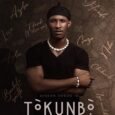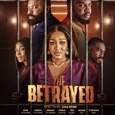Sharon Ooja, Bovi, Pere Egbi, Mr Macaroni, Dorcas Shola-Fapson, Funsho Adeolu, Adunni Ade, Mimi Chaka, Temidayo Adenibuyan
The Perfect Arrangement tells the story of Tade Kalejaiye, a young entrepreneur and daughter of a politician who decides to remove her family from bankruptcy by attempting to marry Chidi Obikwe, who is also facing a political barricade after his sex tape was leaked online and that deterred his political ambition.
Chinaza Onuzo
Chinaza Onuzo, Zulumoke Oyibo
Chinaza Onuzo, Pemi Elujoba
2022
Amazon Prime
Production is of above average quality.
Acting ranges from decent to poor. Writing is quite bad.
Tropes like love triangles might be well worn in Hollywood (and even Nollywood), but there are a few movies that can take an already worn out concept, put a unique spin on it and emerge with a film that appeals to you using the familiar but can stretch its thematic plate to allow for more substance. It is clear that the writers of The Perfect Arrangement have this constantly at the back of their minds, so they will throw in extraneous plotlines to try and break the mold. This, ironically, hampers the movie’s focus and ends up diluting its original romantic storyline.
The Perfect Arrangement follows Tade, a successful fashion designer, who is in a dilemma. Her family’s financial challenges means they may soon lose the privileged lifestyle they had grown used to, but a small glimmer of hope to keep it all persists, but only if she can marry Chidi, her ex, who dumped her five years ago to focus on his political career. Now, as fate will have it, he needs to marry her to achieve his governorship ambitions. It is the perfect arrangement, and everybody should win, except her best friend Cheta, who has loved her silently all these years and will have to watch his brother get wedded to the woman he loves.
That outlines the primary plotline of The Perfect Arrangement, but do not be deceived to think its scope is anywhere that narrow. Do not let its two hour runtime fool you either, because this film takes on so much in that time that it can feel like you’re watching one big trailer for a TV series. A TV series format would have served the purpose of giving attention to subplots and fleshing out characters, two things that are lacking here. I can imagine it as a proper series, where Tade and her family navigate Nigeria’s political scene and its actors, Tade runs her fashion brand and overcomes challenges in the fashion industry, and, maybe, we even get to see the dynamic between Chidi and Cheta and how it evolves with time.
In a movie, though, we can only get bites of all these sections. Direction is by Chinaza Onuzo, and he is affected by the movie’s bloatedness. Some scenes start and end abruptly, for want of time. Sometimes, scenes have been cut halfway, but it is still easy to understand what was cut. Sound mixing is often quite bad, though, and there are scenes where a character is talking, and the background noise is a lot more audible than the lines. Some other direction choices, too, were clear missteps. Like the newspaper headlines that tell us what is going on at each point of the movie—they are poorly designed and I detected a few grammatical errors, and I wasn’t even giving them much scrutiny. For a film with high ambitions it is unforgivable that some of the basics are not properly done. Like acting.
Sharon Ooja is satisfactory as the leading lady, but if you long for the day Nollywood casting directors give a greater focus to acting chops than to fine faces, like I do, I am disappointed to note that today is not that day. Sitting among the rest of this cast though, she is above average. Bovi’s work in stand up comedy means his legacy as a comedian is beyond reproach, but as an actor, especially in a non-comic role, he feels like a fish out of water. The way he delivers his lines, and the body language he gives off when he does so are always odd. They often fail to match the context, much like the movie’s soundtrack from scene to scene. His task is worsened by writers who cannot decide if they want him to be a playboy, a loverboy, an arrogant rich man or a slimy politician, so he can be any of these things from scene to scene.
The other established comedian in the cast, Adebowale Adebayo, or Mr. Macaroni, is exponentially better, and probably the only member of the cast that fully commits to the role. He plays Oba, Tade’s elder brother who, as the first child, handles the business of the family. He regards Tade as a parasitic member of the family, and it is his constant berating that drives her to think up the marriage with Chidi’s family for political goodwill. After that, though, the writers seem to forget it was her idea, and the narrative changes to her being forced into marriage for the family’s gain. Her relationship with her to-be husband is similarly hard to place. At one time she is nearly in tears reconsidering her decision to get married to Chidi, another time she blurts out that she loves him.
This is not the only time our writers have the characters say something that is never backed up in action. Pere Egbi (of BBN) plays Cheta, whose role as the best friend is only conveyed to us in speech, we hardly get to see it, especially compared to her other best friend, Lottie (Wofai Egu Ewa). When he is given more screen time, he and Tade kiss, which isn’t like best friends do, and then they go back to being just friends, before they kiss again. Her relationship with both brothers is very off and on, and not in a good way. It almost appears like two sets of writers wrote alternating scenes and they were not allowed to communicate.
So in the last act they reach a conclusion: Tade is in love with two brothers. This sentence is repeated by several characters, as if the writers are trying to compensate for not portraying it once. In the end, nothing is done to justify its ‘love triangle’ trope, and if you didn’t read the synopsis, you might have missed it. When it is time to resolve this triangle, the writers make one final bad decision that makes every wrong step leading up to it look like child’s play. There was enormous potential here, but the producers cannot decide if they want to make a romantic film or a political drama, and do a bad job of juggling both.








